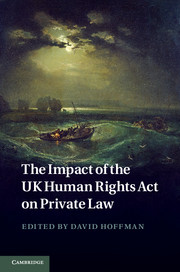Book contents
- Frontmatter
- Contents
- Contributors
- Foreword
- Preface
- Acknowledgements
- Table of cases
- Table of statutes
- Table of statutory instruments
- Table of European Union Legislation
- Abbreviations
- 1 Introduction
- 2 Mapping horizontal effect
- 3 Public authorities: what is a hybrid public authority under the HRA?
- 4 Statute law: interpretation and declarations of incompatibility
- 5 Precedent
- 6 Tort design and human rights thinking
- 7 Privacy: the development of breach of confidence – the clearest case of horizontal effect?
- 8 Nuisance
- 9 Defamation
- 10 Discrimination law
- 11 Damages: private law and the HRA – never the twain shall meet?
- 12 Property and housing
- 13 Commercial law
- 14 Restitution
- 15 Insolvency
- 16 Employment law
- 17 Civil procedure: Article 6 – a welcome boost to the development of English procedural law?
- 18 Conclusions
- Index
- References
3 - Public authorities: what is a hybrid public authority under the HRA?
Published online by Cambridge University Press: 05 November 2011
- Frontmatter
- Contents
- Contributors
- Foreword
- Preface
- Acknowledgements
- Table of cases
- Table of statutes
- Table of statutory instruments
- Table of European Union Legislation
- Abbreviations
- 1 Introduction
- 2 Mapping horizontal effect
- 3 Public authorities: what is a hybrid public authority under the HRA?
- 4 Statute law: interpretation and declarations of incompatibility
- 5 Precedent
- 6 Tort design and human rights thinking
- 7 Privacy: the development of breach of confidence – the clearest case of horizontal effect?
- 8 Nuisance
- 9 Defamation
- 10 Discrimination law
- 11 Damages: private law and the HRA – never the twain shall meet?
- 12 Property and housing
- 13 Commercial law
- 14 Restitution
- 15 Insolvency
- 16 Employment law
- 17 Civil procedure: Article 6 – a welcome boost to the development of English procedural law?
- 18 Conclusions
- Index
- References
Summary
An analysis of when the HRA subjects private bodies to the Convention is highly germane to any discourse concerning the impact of the HRA on private law. The common law horizontal effect mechanism is one route through which to hold private bodies, albeit indirectly, to Convention standards. Another route is through the hybrid public authority scheme – if a private body performs ‘functions of a public nature’ under section 6(3)(b), it is regarded as a public authority and must respect the Convention during its public activity.
This chapter builds on earlier work which attempts to coax the judges into adopting a wider interpretation of section 6(3)(b). Its central message is that there is no need for the courts to construe that provision as restrictively as they have done since the HRA entered into force. While ostensibly public in nature, hybrid public authorities are institutionally private bodies. The crucial effect of this, coupled with a close analysis of relevant Strasbourg jurisprudence, is that hybrids enjoy Convention rights themselves under the HRA, even during the performance of their public functions. They can therefore assert their own Convention rights as a defence to Convention-based challenges by claimants in court – a powerful method of self-protection which, once properly appreciated, should help ease judicial reluctance to widen the scope of section 6(3)(b).
- Type
- Chapter
- Information
- The Impact of the UK Human Rights Act on Private Law , pp. 48 - 65Publisher: Cambridge University PressPrint publication year: 2011
References
- 1
- Cited by



